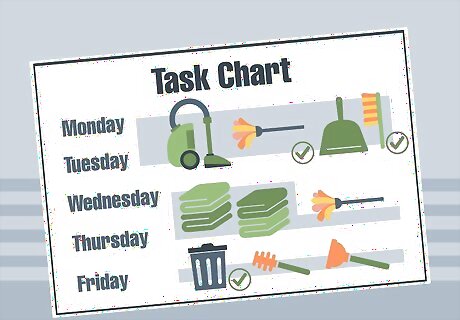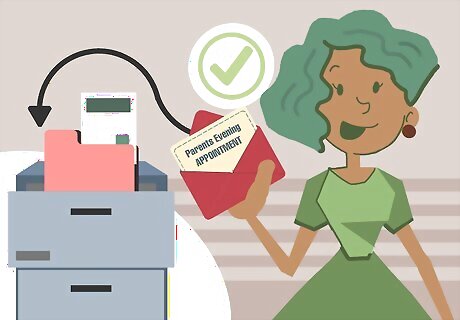
views

Be willing to set limits and ensure that your way is followed. This is the first and most important thing that you can possibly do. This means limits as to the times, levels of noise and activity and yes, bedtimes. For the parents too, If the kids have to get their parents out of bed for a ride to school that will be a horrible reoccurring situation every morning. That can easily be avoided by going to bed at the same time as your kids, your sleep is important also but don't expect to sleep when your kids need rides to school.

Visualize a calmer home. What do you see? Write down the things that you visualize and turn them into goals to achieve in creating your calmer household. In your subconscious mind, you will unearth a true picture of the house that you'd like to be in - always keep this focus in your mind and work towards it gradually.

Sit down and write a list of the things that seem to be creating the most noise and sense of rushing in your home. These are the first things that you will target with your limits. Consider such things as when you are prepared to receive visitors, limiting the noise level of the TV and limiting to computer usage. And put a ban on running indoors for the little ones. Kids need toys and entertainment but this doesn't mean TV and video games. Play Chess, Mahjong, Backgammon instead of video games. An investment in good traditional games or board games may prove cheaper than running a TV or video games console.

Write a task chart. This task chart must apply to every single member of the household and it must contain days and deadlines. The larger the job that needs tackling, the longer the time frame you must give it in order to maintain a calm approach to it - bit by bit will get it done rather than rushing around juggling too many things at once.

Tidy the clutter away. Clutter enhances the feeling of stress, rushing and inability to think straight. The fewer bits and pieces in your pathway, the calmer you are going to feel. Not to mention the less cleaning up involved. If the kids must keep so many toys, books, and video games, make a deal with them. They can be kept in storage spaces but if they are found strewn across the floor more than 3 times in a row, they will be donated to the nearest charity store. You must mean this and you must be prepared to do it for this ultimatum to have real effect.

Clean as you create. Cooking creates less mess if you can wash items as you use them in between cooking moments. Same for anything that gets used - retrain everyone to put it back where it came from the moment it has been used. Buy storage bins or baskets with labels if this helps to encourage everyone to do the right thing.

Plan meals. If you are always wondering what to make for dinner, spend half an hour a week (Sunday evening is often a good time) to write out a plan of meals. It doesn't have to be incredibly specific or you will dull down the cooking process and spontaneity, but at least write "pasta - Mon", "steak - Tues", "pizza - Wed", "sushi - Thurs", "take-out - Fri". That way you have an idea of the main meal and can decide on the flavors and style on the night, with the main ingredients at hand.

Ask visitors to respect your limits. Inform visiting family, friends, kids, dogs, and any other guests who regularly traipse in and out of your home that closing time is whatever you set it as. In addition, feel free to set out of bounds hours, such as family lunch times on Sundays. This will enable you and your family to connect together over a special meal or activity without outside interruptions. This also includes taking the phone off the hook and closing e-mail applications.

File it or lose it! As soon as it arrives in the post, the schoolbag or the briefcase, deal with it. Open envelopes and toss them into the recycling immediately. Read the letter, bill, or note and file it. Make bill-paying time once a week and sit down with the file and deal with it in a matter-of-fact way, one by one. If you get school notes, decide when to sit down with your child to discuss these matters, then sign them away and put back in the schoolbag, and if money is asked for, write the check there and then and put it into the schoolbag. These actions will take several minutes, but spending more time on school and child matters is more important.

Set aside calm time. At least once a week, and preferably once a day, set aside calm time for yourself in which you do nothing more than relax and shut out all that is around you. Eventually encourage other family members to join you in this. Select a special corner or room in the house and set it up just for this purpose, with soft pillows and drapes and call it something neat like "Mom's Relaxation Corner" or "Family Downtime Zone". Familiarize everyone in the house with this space as only ever being for relaxation by any member of the family at any time of the day or night. It must be away from TVs, music or other sources of noise and disruption. Peace is a virtue and can be hard to acquire in our busy lives. However, there are many simple ways that we have overlooked and should try to encourage in our day-to-day lives.-













Comments
0 comment